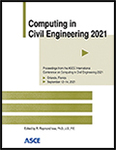A Dynamic Controller for Residential Energy Management at the Intersection of Occupant Thermal Comfort and Dynamic Electricity Price
Publication: Computing in Civil Engineering 2021
ABSTRACT
HVAC systems account for 50% of buildings’ energy use and could play a critical role in energy management in buildings both for energy-saving, and demand-side management to reduce peak energy use. According to contextual demands of occupants, efficient control of HVAC systems could result in peak energy saving and decreased energy costs in demand response programs. Accordingly, in this paper, we have introduced an agent-based model consisting of three agents: human agent, thermostat agent, and utility agent. In this model, the thermostat agent receives the real-time electricity price from the utility agent and aggregates thermal comfort profiles of the occupants from human agents. By considering these inputs, the thermostat agent employs a predictive model of a house and calculates the next set point of the HVAC system on energy cost and occupants’ comfort. Then, the thermostat agent signals the suggested set point to the thermostat of the building at each time step. For evaluating the proposed controller’s performance, the electricity price profile from ERCOT, which supplies the state of Texas, is used as a signal from the utility agent. Realistic thermal comfort data were used to simulate the thermal preference of occupants represented as human agents. The evaluation was carried out in a co-simulation using a Python and EnergyPlus model of a residential unit. Our results show that the proposed controller reduces the peak energy by 5.5% to 10% and increases occupants’ thermal satisfaction up to 12%. The main contribution of this paper is developing an agent-based model that humans, as the main stakeholders of the buildings, play a role in controlling HVAC systems for peak reduction and energy saving.
Get full access to this chapter
View all available purchase options and get full access to this chapter.
REFERENCES
Afzalan, M., and F. Jazizadeh. (2018). Efficient integration of smart appliances for demand response programs. Proceedings of the 5th Conference on Systems for Built Environments, ACM.
Afzalan, M., and F. Jazizadeh. (2019). “Residential loads flexibility potential for demand response using energy consumption patterns and user segments.” Applied Energy 254: 113693.
Afzalan, M., and F. Jazizadeh. (2020). “A Machine Learning Framework to Infer Time-of-Use of Flexible Loads: Resident Behavior Learning for Demand Response.” IEEE Access 8: 111718–111730.
ASHRAE. (2017). Thermal Environmental Conditions for Human Occupancy. A. ASHRAE, GA.
Cheung, T., S. Schiavon, T. Parkinson, P. Li, and G. Brager. (2019). “Analysis of the accuracy on PMV – PPD model using the ASHRAE Global Thermal Comfort Database II.” Building and Environment 153: 205–217.
Daum, D., F. Haldi, and N. Morel. (2011). “A personalized measure of thermal comfort for building controls.” Building and Environment 46(1): 3–11.
EIA. (2012). Residential Buildings Energy Consumption Survey: Energy Usage Summary.
EIA. (2014). Peak-to-average electricity demand ratio rising in New England and many other U.S. regions.
Haider, H. T., O. H. See, and W. Elmenreich. (2016). “A review of residential demand response of smart grid.” Renewable and Sustainable Energy Reviews 59: 166–178.
He, Y., B. Wang, J. Wang, W. Xiong, and T. Xia. (2012). “Residential demand response behavior analysis based on Monte Carlo simulation: The case of Yinchuan in China.” Energy 47(1): 230–236.
Jazizadeh, F., A. Ghahramani, B. Becerik-Gerber, T. Kichkaylo, and M. Orosz. (2013). Personalized Thermal Comfort Driven Control in HVAC Operated Office Buildings. ASCE International Workshop on Computing in Civil Engineering (IWCCE) Conference.
Jazizadeh, F., A. Ghahramani, B. Becerik-Gerber, T. Kichkaylo, and M. Orosz. (2014). “Human-Building Interaction Framework for Personalized Thermal Comfort-Driven Systems in Office Buildings.” Journal of Computing in Civil Engineering 28(1): 2–16.
Jazizadeh, F., A. Ghahramani, B. Becerik-Gerber, T. Kichkaylo, and M. Orosz. (2014). “User-led decentralized thermal comfort driven HVAC operations for improved efficiency in office buildings.” Energy and Buildings 70: 398–410.
Jung, W., and F. Jazizadeh. (2020). “Energy saving potentials of integrating personal thermal comfort models for control of building systems: Comprehensive quantification through combinatorial consideration of influential parameters.” Applied Energy 268.
Li, Y., J. De La Ree, and Y. Gong. (2018). The smart thermostat of HVAC systems based on PMV-PPD model for energy efficiency and demand response. 2nd IEEE Conference on Energy Internet and Energy System Integration (EI2).
Sandip kr. Gupta, T. G., and K. Chatterjee. (2018). Droop Based Dynamic Demand Response Controller for HVAC Load. 20th National Power Systems Conference (NPSC).
Shariatzadeh, F., P. Mandal, and A. K. Srivastava. (2015). “Demand response for sustainable energy systems: A review, application and implementation strategy.” Renewable and Sustainable Energy Reviews 45: 343–350.
Strengers, Y. (2013). The Global Challenge of Encouraging Sustainable Living.
Vedullapalli, D. T., R. Hadidi, and B. Schroeder. (2019). Optimal Demand Response in a building by Battery and HVAC scheduling using Model Predictive Control. IEEE/IAS 55th Industrial and Commercial Power Systems Technical Conference (I&CPS).
Yoon, J. H., R. Baldick, and A. Novoselac. (2014). “Dynamic Demand Response Controller Based on Real-Time Retail Price for Residential Buildings.” IEEE Transactions on Smart Grid 5(1): 121–129.
Yoon, J. H., R. Baldick, and A. Novoselac. (2016). “Demand response control of residential HVAC loads based on dynamic electricity prices and economic analysis.” Science and Technology for the Built Environment 22(6): 705–719.
Yoon, J. H., R. Bladick, and A. Novoselac. (2014). “Demand response for residential buildings based on dynamic price of electricity.” Energy and Buildings 80: 531–541.
Information & Authors
Information
Published In
History
Published online: May 24, 2022
Authors
Metrics & Citations
Metrics
Citations
Download citation
If you have the appropriate software installed, you can download article citation data to the citation manager of your choice. Simply select your manager software from the list below and click Download.
